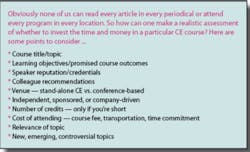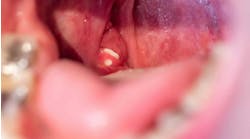by Anne Nugent Guignon, RDH, MPH
The discussion took a tangential turn and focused on who needs to continue learning more - a new graduate or a seasoned clinician. Obviously there is no clear-cut answer, but since I graduated 36 years ago this month I have experienced a lot, which helps me know what to look for in a continuing-education course, how to apply the information, and the value of the experience.
Even though I now spend a lot of time researching topics, updating CE presentations, or preparing to present a program, I was not always a poster child for continuing education. In fact, the formal dental hygiene educational process was not a stimulating experience, and consequently I spent the first 10 years of my career on cruise control. There were no mandatory CE requirements tied into my state licenses in the ‘70s, and I consciously avoided educational interactions because the thought of sitting through another course was totally unappetizing to me. I had all of the usual excuses: no time, no money, complicated life, and boring courses, but 10 years of complacency took their toll - isolation.
I joined ADHA in 1982 on a dare. What a shock! I went to the annual session at the Palmer House in Chicago, and the experience was life-altering. One particular course on oral pathology was amazing. The information was timely and interesting. I became hooked on the idea of lifelong professional learning and became the chair of continuing education for my local component. The value of a quality experience was clear, and I spent years planning and orchestrating CE opportunities for my colleagues in the Houston area.
What does this discourse have to do with why you should participate in continued learning? We all need to get our batteries recharged, learn about new products and techniques, and interact with our professional colleagues. Dental hygiene is rewarding but hard. It challenges our bodies and minds from the time we step through the door to the last chart entry in the day.
Even if you just graduated, you are behind the curve. There is so much to learn and dental hygiene programs can only teach so much. Schools must provide a good, basic education that will prepare graduates to pass state and national exams. In addition, most dental hygiene schools suffer from significant budgetary restraints, so new graduates may not know how to practice with the most current technologies. Each of us must realize that we have a professional responsibility to progress beyond the basics.
If you graduated 20 years ago, do you really need to take CE? Of course! The world is changing faster than any of us could ever imagine, and it is impossible to be totally up-to-date on all aspects of dental hygiene practice. While many people believe I have expertise in such areas as ergonomics and power-driven scaling, it doesn’t mean that seasoned veterans like me shouldn’t take courses. There is so much to learn that none of us can be an expert in everything. It is a real thrill to participate in a course that challenges the status quo or looks at a problem from a different point of view. Are you intrigued by a speaker who discusses fresh ideas or verifies that you are on top of the game in a particular area of dental hygiene? It’s an added bonus to learn from people you admire or who are passionate about their message.
Comments such as “I’ve already gotten all of my CEs for the year,” or “I didn’t go to that program because it was six credits and I only need two,” or my favorite, “My doctor pays for the CEs he/she wants me to take, so that’s what I go to” will not help you get ahead. (Warning: I’m climbing on my soapbox.) The required minimum is just that - a minimum. No CE police will tell you that you can’t take more, so what is the barrier? Certainly your brain won’t explode if you learn more.
Are you worried about learning something that you may not be able to implement?
The entire discussion of remineralization has been driven by dental hygiene leaders who are willing to forge ahead with new thoughts on how to protect and rebuild tooth structure in a manner compatible with Mother Nature. When you learn more about these exciting concepts and protocols, it will be that much easier for you to discuss implementing new diagnostic and therapeutic procedures in your own practice.
If you doubt that dental hygienists have the power to be catalysts for change, just look at power toothbrushes. Every company that produces power brushes knows that dental hygienists created and supported that movement. Hygienists instinctively understood the benefits of these devices and the science that supported their development. I don’t know a hygienist on the planet who wants to return to the days of hand brushes only.
Are you a credit seeker, a CE junkie, or a fence sitter? Credit seekers are motivated by cost, number of credits, and location of the course. The subject may or may not be important. They want to get in and out quickly with the least amount of effort. CE junkies drive or fly hundreds of miles for courses. Expense is not a primary consideration, and their portfolios are crammed full of certificates. Junkies want to learn from the speakers and the other participants, and they want to savor the entire experience. Fence sitters are an interesting group because they can go either way, but once a fence sitter becomes a CE junkie, their professional life lights up.
Are continuous learning experiences really necessary? Yes, because lifelong learning creates the foundation for your professional comfort zone and is critical if you are going to have a long and satisfying career. In less than two months, more than 1,000 dental hygienists will convene in the nation’s capital for one of our profession’s most outstanding conferences, RDH Under One Roof. If you’ve never been, consider going, even if you won’t know a soul. If you’ve been to UOR, you understand the magic. For more information, go to www.rdhunderoneroof.com and check out my blog. OK, I’m putting my soapbox away and I’ll see you all in D.C. in August.
Anne Nugent Guignon, RDH, MPH, is the senior consulting editor for RDH magazine. She is an international speaker who has published numerous articles and authored several textbook chapters. Her popular programs include ergonomics, patient comfort, burnout, and advanced diagnostics and therapeutics. Recipient of the 2004 Mentor of the Year Award, Anne is an ADHA member and has practiced clinical dental hygiene in Houston, Texas, since 1971. You can reach her at [email protected] or (713) 974-4540, and her Web site is www.anneguignon.com.







